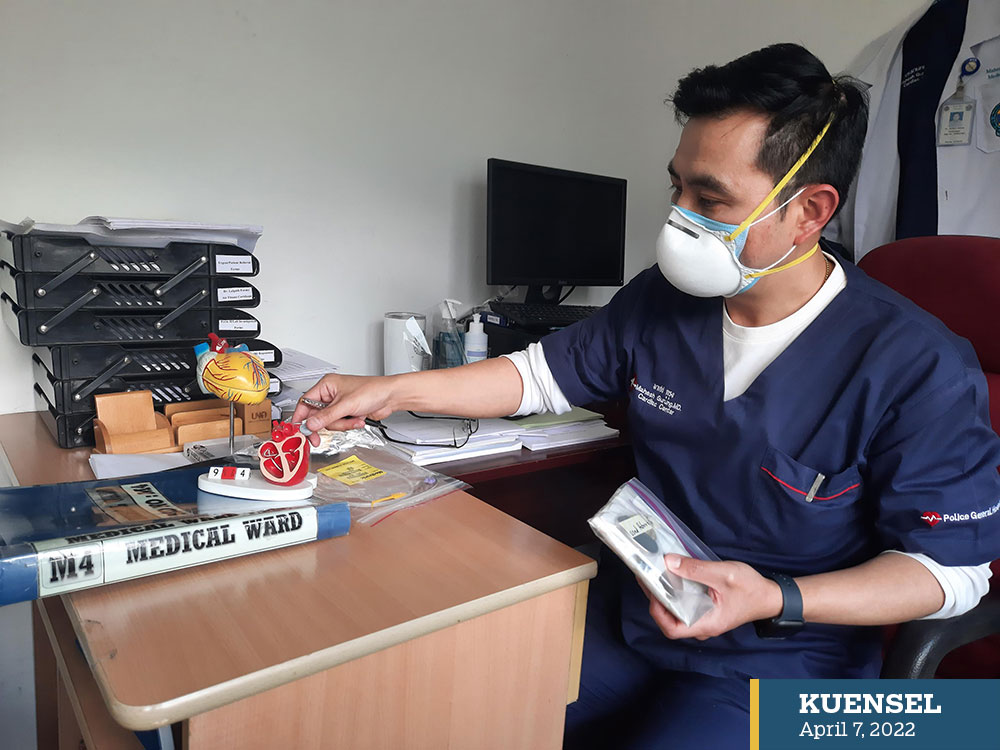Nima Wangdi
With an interventional cardiologist having joined the Jigme Dorji Wanghuck National Referral Hospital (JDWNRH) after his studies, patients now will no longer have to be referred abroad for pacemaker device implantation.
Dr Mahesh Gurung completed his super-specialisation in interventional cardiology and cardiac device implantation in Thailand. He joined the hospital from February this year.
Dr Mahesh Gurung is the only interventional cardiologist at the JDWNRH.
The surgery involves implanting a small electrical device (pacemaker), about the size of a matchbox or smaller, in the patient’s chest, below the collarbone.
The pacemaker sends electrical impulses to the heart through wires to keep it beating regularly or not too slowly. The pacemakers are bought from India for Nu 90,000 apiece.
Recently, a heart patient who had also tested positive to the Covid-19, was saved after implanting a temporary pacemaker at the ICU of the National Covid-19 hospital at Taba in Thimphu.
Dr Mahesh said the patient would not have survived without the pacemaker. “Referral had become difficult due to the pandemic and there were quarantine requirements then.”
He implanted the temporary pacemaker on March 19 on the 68-year-old man.
“He was left to recover from the Covid-19 and then was brought to JDWNRH where permanent pacemaker was implanted.”
Dr Mahesh said the normal rate of heartbeat in the person is 60 to 100 per minute. The patient’s heartbeat had dropped to 20 beats per minute. “The team went to the ICU and the temporary pacemaker was implanted.”
“His swollen heart causing complications has shrunk to the normal size and the patient is doing well,” Dr Mahesh said.
He said the permanent pacemaker lasts for five to 10 years depending up on how much the heart uses it. The pacemaker will not be used if the heartbeat becomes normal. The device should be replaced after that. “The patients with pacemaker must be regularly checked on different time intervals.”
He said that with more aging population in the country, heart diseases were likely to increase. He said healthy diet, exercising, and maintaining body weight are the key to prevent heart diseases.
Dr Mahesh said, some patients, especially from the rural areas, didn’t not even want to go abroad for pacemaker implantation due to language barrier. It also involved risk, as lives were lost in the process of referral. “These are some benefits of it besides the huge cut down in referral expense.”
Follow up on the old cases
Dr Mahesh said a total of 56 people have got pacemaker implanted as of yet and three are waiting to get it done soon.
He said that since the old cases have not been followed up, the hospital was collecting all the data on them because most of the patients think it is done once the device is implanted, which is not the case. “In some, the batteries would have already depleted and we won’t know until we check.”
He has replaced the device for a 14-year-old girl in whom the battery of the device had depleted.
“The hospital is also working towards establishing a pacemaker clinic at the hospital where all the patients can come and get checked up regularly,” he said.
He said that when patients are referred, it incurred package expense of about Nu. 400,000 depending on the complexity of the cases.


